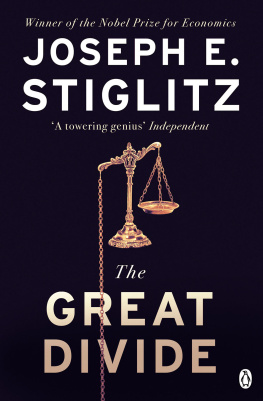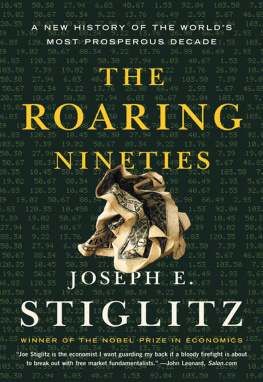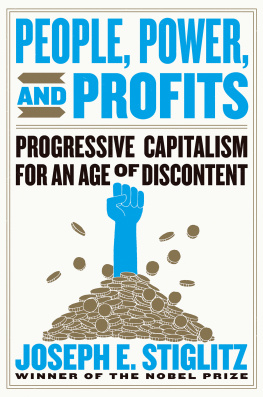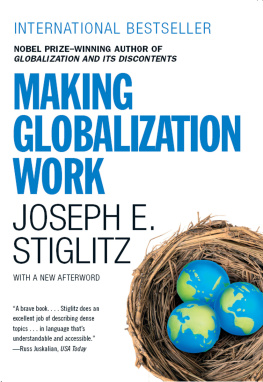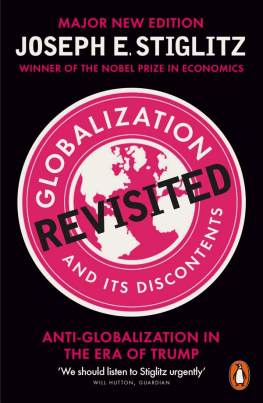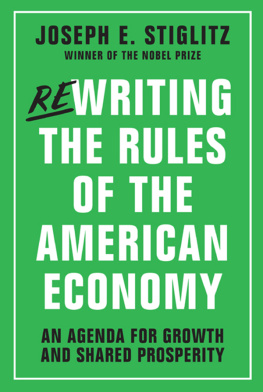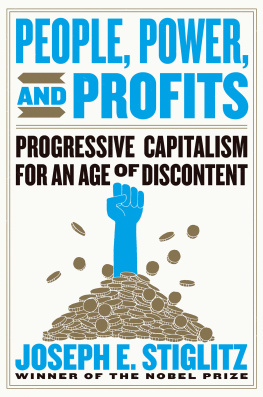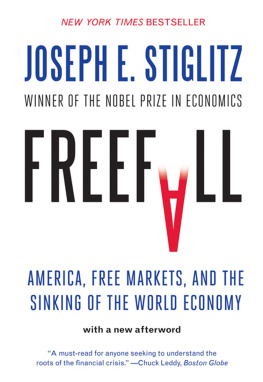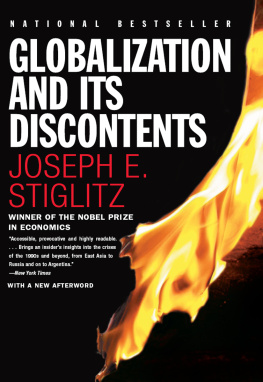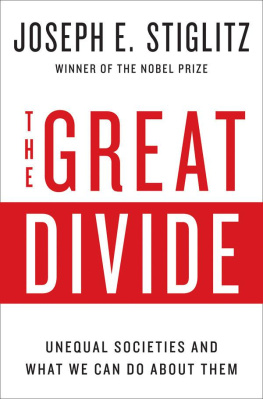Contents
Joseph Stiglitz
THE GREAT DIVIDE
PENGUIN BOOKS
UK | USA | Canada | Ireland | Australia
India | New Zealand | South Africa
Penguin Books is part of the Penguin Random House group of companies whose addresses can be found at global.penguinrandomhouse.com.
First published in the United States of America by
W. W. Norton & Company, Inc. 2015
First published in Great Britain by Allen Lane 2015
Published in Penguin Books 2016
Text copyright Joseph E. Stiglitz, 2015
Cover design: Leo Nickolls/Image Alamy
The moral right of the author has been asserted
ISBN: 978-0-241-20291-3
PENGUIN BOOKS
THE GREAT DIVIDE
Joseph Stiglitz was Chief Economist at the World Bank until January 2000. He is currently University Professor of the Columbia Business School and Chair of the Management Board and Director of Graduate Summer Programs, Brooks World Poverty Institute, University of Manchester. He won the Nobel Prize for Economics in 2001 and is the best-selling author of Globalization and Its Discontents, The Roaring Nineties, MakingGlobalization Work, Freefall, The Price of Inequality, The Great Divide, and his latest, The Euro, all published by Penguin.
THE BEGINNING
Let the conversation begin...
Follow the Penguin Twitter.com@penguinUKbooks
Keep up-to-date with all our stories YouTube.com/penguinbooks
Pin Penguin Books to your Pinterest
Like Penguin Books on Facebook.com/penguinbooks
Listen to Penguin at SoundCloud.com/penguin-books
Find out more about the author and
discover more stories like this at Penguin.co.uk
To my many readers, who have responded with such enthusiasm to my writings on inequality and opportunity.
To my children, Siobhan, Michael, Jed, and Julia, and my wife, Anya, all of whom, in their own way, are striving to create a fairer and better world.
And to the scholars and activists everywhere who work with such dedication for social justice.
Thank you for the inspiration and encouragement you have provided.
Introduction
No one today can deny that there is a great divide in America, separating the very richestsometimes described as the 1 percentand the rest. Their lives are different: they have different worries, different aspirations, and different lifestyles.
Ordinary Americans worry about how they will pay for the college education of their children, about what happens if someone in the family has a serious illness, about how they are to manage their retirement. In the depths of the Great Recession, tens of millions worried whether they would be able to keep their house. Millions werent able to do so.
Those in the 1 percentand even more the upper .1 percentdebate other issues: what kind of jet airplane to buy, the best way to shelter their income from taxes (What happens if the United States forces the end to bank secrecy in Switzerlandwill the Cayman Islands be next? Is Andorra safe?). On the beaches of Southampton they complain about the noise their neighbors make as they helicopter in from New York City. They worry, too, about what would happen if they fell off their perchthere is so far to fall, and on rare occasions it does happen.
Not long ago I found myself at a dinner party hosted by a bright and concerned member of the 1 percent. Aware of the great divide, our host had brought together leading billionaires, academics, and others who were worried about inequality. As the evenings early chitchat burbled on, I overheard one billionairewho had gotten his start in life by inheriting a fortunediscuss with another the problem of lazy Americans who were trying to free ride on the rest. Soon thereafter, they seamlessly transitioned into a discussion of tax shelters, apparently unaware of the irony. Several times in the evening, Marie Antoinette and the guillotine were invoked as the gathered plutocrats reminded each other of the risks of allowing inequality to grow to excess: Remember the guillotine set the tone for the evening. And in that refrain they confessed a central message of this book: the level of inequality in America is not inevitable; it is not the result of inexorable laws of economics. It is a matter of policies and politics. It was, they seemed to be saying, possible for these powerful men to do something about inequality.
This is but one of the reasons why concern about inequality has become urgent even among the 1 percent: increasing numbers of them realize that sustained economic growth, upon which their prosperity depends, cant happen when the vast majority of citizens have stagnant incomes.
Oxfam forcefully brought home the extent of the worlds growing inequality to the annual gathering of the worlds elite in Davos in 2014, pointing out that a bus with some 85 of the worlds billionaires had as much wealth as the bottom half of its population, some three billion people. By a year later the bus had shrunkit required only 80 seats. Just as dramatic, Oxfam found that the top 1 percent of the world now owned nearly half the worlds wealthand are on track to own as much of the rest of the 99 percent combined by 2016.
The great divide has been a long time in coming. In the decades after World War II the country grew at its fastest pace, and the country grew together. While all segments saw an increase in their incomes, it was shared prosperity. Incomes of those at the bottom grew faster than the incomes of those at the top.
It was a golden age in America, but to my young eyes there appeared darker edges. Growing up on the southern shore of Lake Michigan, in one of the countrys iconic industrial towns, Gary, Indiana, I saw poverty, inequality, racial discrimination, and episodic unemployment as one recession after another battered the country. Labor strife was common as workers struggled to get a fair share of Americas deservedly lauded prosperity. I heard rhetoric about America being a middle-class society, but for the most part, the people I saw occupied the lower rungs of that supposed middle-class society, and their voices were not among those that were shaping the country.
We were not rich, but my parents had adjusted their lifestyle to their incomesand in the end that is a big part of the battle. I wore hand-me-down clothes from my brother that my mother had always bought on sale, with an eye toward durability rather than saving money in the short run: penny wise but pound foolish, she would say. When I was growing up, my mother, who had graduated from the University of Chicago in the midst of the Great Depression, helped my father in his insurance business. When she was working, we were left in the care of our help, Minnie Fae Ellis, a loving, hardworking, and bright woman. Even as a 10-year-old, I was disturbed: I wondered, Why did she have only a sixth-grade education, in a country that was supposedly so rich and that supposedly offered opportunities for all? Why was she taking care of me rather than her own children?

